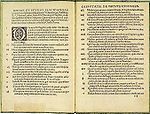- Magisterial Reformation
-
Protestant Reformation
- Waldensians (I 12th century)
- Avignon Papacy (1309–77)
- John Wycliffe (E, 1320–84)
- Western Schism (1378–1417)
- Jan Hus (B, ~1369–1415)
- Hussite Wars (1420–~34)
- Northern Renaissance
- German mysticism
- The Ninety-Five Theses
- German Peasants' War
- Schmalkaldic League
- Magisterial · Radical · Counter
- Martin Luther
- Philipp Melanchthon
- Thomas Müntzer
- Menno Simons
- Martin Bucer
- Olaus & Laurentius Petri
- Huldrych Zwingli
- John Calvin
- John Knox
- Primož Trubar
- Reformation by location
Czech lands · Denmark-Norway and Holstein · England
Germany · Italy · Netherlands · Polish-Lithuanian Commonwealth · Scotland · Sweden · France · SwitzerlandThe Magisterial Reformation is a phrase that "draws attention to the manner in which the Lutheran and Calvinist reformers related to secular authorities, such as princes, magistrates, or city councils", i.e. "the magistracy".[1] While the Radical Reformation rejected any secular authority over the Church, the Magisterial Reformation argued for the interdependence of the church and secular authorities, i.e. "The magistrate had a right to authority within the church, just as the church could rely on the authority of the magistrate to enforce discipline, suppress heresy, or maintain order."[2]
References
Categories:- Protestant Reformation
- Christianity stubs
Wikimedia Foundation. 2010.

